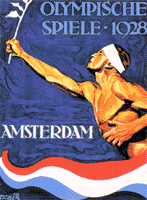HISTORY OF THE MODERN OLYMPICS
Amsterdam, Netherlands, 1928
 |
| Olympic posters from the Archives, Olympic Museum Lausanne, from the book The Olympic Spirit, published by Tehabi Books |
Germany returned to Olympic competition, and the 1928 Games saw the debut of the Olympic flame. Over 3,000 athletes (including nearly 300 women), representing 46 nations, participated in the Olympics. The men's athletics competition was noteworthy for two reasons. It was last Olympic Games for the great Paavo Nurmi and Ville Ritola of Finland. It was also the poorest performance to date for the U.S. team, which won only three of a possible 12 gold medals in running events. Percy Williams of Canada won both the 100- and 200-metre runs. Controversy arose in the women's 800-metre run when several women collapsed from exhaustion at the end of the race; Olympic officials concluded that the distance was too long for women, and it was not until the 1960 Games in Rome that women were allowed to compete in a race of more than 200 metres.
The Japanese swim team won the most medals in the swimming competition. Johnny Weissmuller of the United States concluded his Olympic career with gold medals in the 100-metre freestyle and the 800-metre freestyle relay, and American Peter Desjardins won both the springboard and platform diving events. The Hungarian sabre team won the first of seven consecutive gold medals.
Introduction * Early History * Revival of the Olympics * Organization of the Modern Games